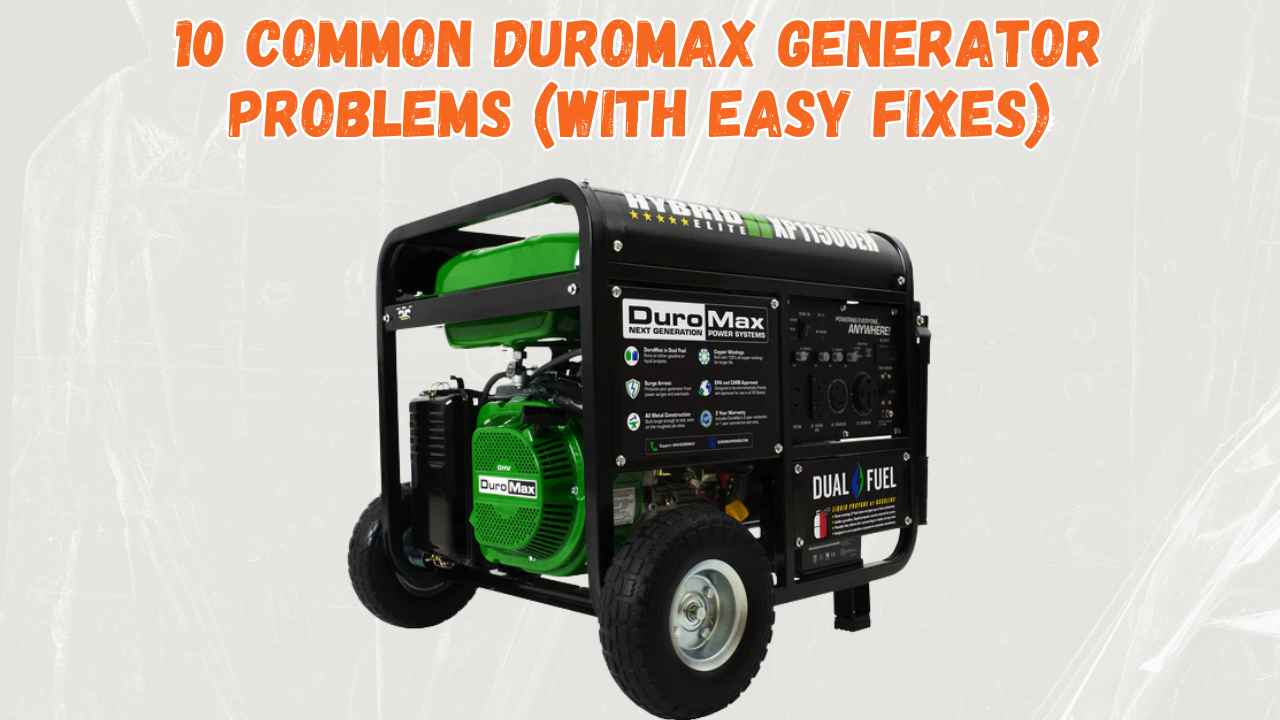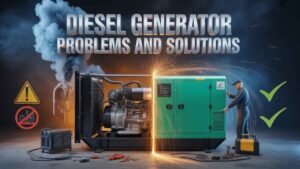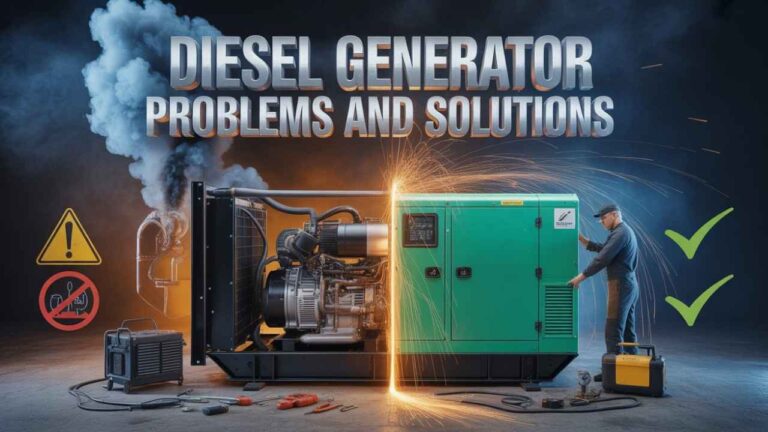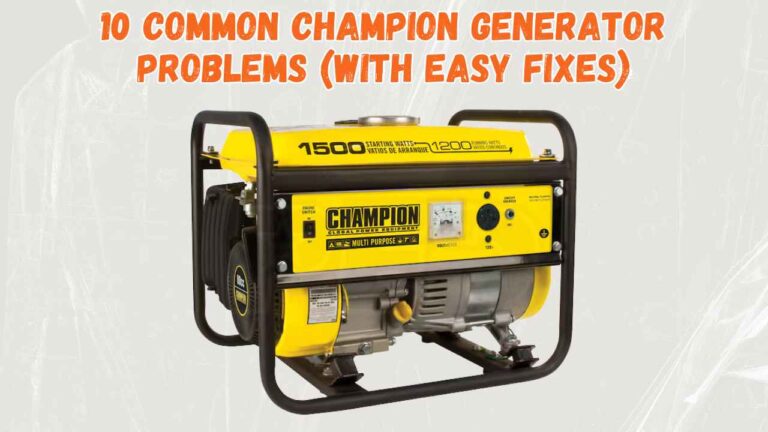Generators are a lifesaver during power outages, but they can face issues over time.
Duromax Generator problems can range from starting troubles to fuel inefficiencies. The good news?
Most of these issues are simple to fix with a little guidance! This guide will walk you through common problems and easy solutions to keep your generator running smoothly.
Duromax Generator Problems (Short Overview)
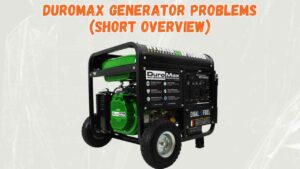
Duromax generators can face issues like difficulty starting, low power output, or unusual noises.
These problems often result from clogged filters, old spark plugs, or low oil levels.
Don’t worry with regular maintenance and quick troubleshooting, you can get your generator back in action fast!
1. The Generator Won’t Start
Causes:
The most frequent culprits are a lack of fuel, old or stale fuel, or a low oil level triggering the safety sensor.
It could also be a dead battery in electric start models, or the choke being in the wrong position.
Lastly, a fouled spark plug can prevent the engine from igniting.
Fixes:
First, check the fuel tank and make sure it has fresh gasoline. If the fuel is over a month old, drain and replace it.
Verify the oil level and top it off if it’s low. For electric start models, ensure the battery is charged.
Set the choke to the “START” position for a cold engine and make sure the fuel valve is open. If none of that works, remove and clean or replace the spark plug.
2. The Generator Runs Rough or Sputters
Causes:
The primary cause is often a clogged carburetor from old fuel leaving gummy deposits.
A dirty air filter can also restrict airflow, disrupting the fuel-to-air mixture.
Additionally, using old or water-contaminated fuel can lead to inconsistent combustion and rough running.
Fixes:
Start by replacing the air filter, as it’s a quick and inexpensive fix.
If the problem persists, the carburetor likely needs cleaning.
You can use a carburetor cleaning spray or, for more stubborn blockages, remove and soak it.
Always ensure you are using fresh fuel to prevent this issue from recurring.
3. The Generator Produces No Power
Causes:
This issue is often caused by a tripped circuit breaker, which is designed to protect the generator from overloads.
A faulty alternator or a bad Automatic Voltage Regulator (AVR) can also be the reason.
The AVR is responsible for maintaining a consistent voltage output, and if it fails, power generation stops.
Fixes:
First, check the circuit breakers on the generator’s panel and reset them if they are tripped.
If the breakers are fine, the problem may be the AVR.
You can test the AVR with a multimeter or have a professional inspect it. In some cases, a simple “flashing the field” procedure can re-excite the alternator, but this should be done with caution.
4. The Generator is Overheating
Causes:
Overheating is typically caused by running the generator in a poorly ventilated area, which prevents cool air from circulating.
A low oil level is another major cause, as oil is crucial for cooling the engine’s internal components.
An overloaded generator working too hard can also overheat.
Fixes:
Immediately turn off the generator and let it cool down completely.
Move it to an open, well-ventilated space away from walls or obstructions. Check the oil level and add more if needed.
Finally, reduce the electrical load by unplugging some devices before restarting it.
Read Also:
Diesel generator problems and solutions
5. The Generator is Leaking Fuel
Causes:
Fuel leaks are commonly caused by cracked or degraded fuel lines, which can become brittle over time.
A faulty fuel petcock (the on/off valve) or a damaged carburetor float bowl gasket can also be the source of the leak.
Overtightening connections can sometimes crack them, leading to leaks.
Fixes:
Turn off the generator and close the fuel valve. Carefully inspect the fuel lines, petcock, and carburetor for the source of the leak.
Replace any cracked lines or faulty gaskets. It’s often best to replace all fuel lines at once, as they tend to degrade at a similar rate.
Ensure all connections are secure but not overtightened.
6. The Generator is Excessively Loud
Causes:
A loose or damaged muffler is the most common reason for excessive noise.
Worn-out engine bearings or loose components on the generator frame can also create rattling or grinding sounds.
An unbalanced load can sometimes cause the engine to vibrate more than usual, increasing noise levels.
Fixes:
With the generator off and cool, inspect the muffler and its mounting brackets for any loose bolts or signs of damage; tighten or replace parts as needed.
Check for any loose covers, panels, or components on the generator’s frame and secure them.
If you suspect internal engine noise, it’s best to consult a professional mechanic.
7. The Generator Shuts Down Unexpectedly
Causes:
The most common cause is the low-oil sensor, which automatically shuts down the engine to prevent damage.
An overloaded generator can also trip its internal protection circuits. Overheating is another frequent reason for an unexpected shutdown.
In some cases, a blocked fuel cap vent can create a vacuum in the tank, starving the engine of fuel.
Fixes:
Let the generator cool down, then check the oil level and add more if it’s low.
Reduce the number of devices plugged into the generator to ensure it’s not overloaded.
Make sure the generator is in a well-ventilated area. Also, check that the fuel cap vent is open and not clogged with debris.
8. White or Blue Smoke from the Exhaust
Causes:
White or light-gray smoke usually indicates that the engine is overloaded.
Blue smoke is a sign that the engine is burning oil, which can be caused by overfilling the crankcase with oil, worn piston rings, or a bad valve seal.
This is a more serious issue that needs attention.
Fixes:
If you see white smoke, immediately reduce the electrical load on the generator.
For blue smoke, first check the oil level. If it’s overfilled, drain the excess oil.
If the oil level is correct but blue smoke continues, the engine may have internal wear, and you should seek professional service.
9. The Battery is Not Charging (Electric Start Models)
Causes:
This issue is often due to a faulty charging coil (stator) within the generator, which is supposed to recharge the battery while the engine runs.
Corroded or loose battery terminals can also prevent a proper connection and charging. The battery itself might be old and no longer able to hold a charge.
Fixes:
Start by cleaning the battery terminals with a wire brush and ensuring the connections are tight.
If that doesn’t work, test the battery’s voltage; if it’s low, try charging it with an external charger.
If it still won’t hold a charge, replace the battery. If a new battery also fails to charge, the charging coil likely needs to be replaced.
10. Fuel is Contaminated
Causes:
Gasoline can go stale in as little as 30 days, leaving behind gummy deposits that clog fuel systems.
Water can enter the tank through condensation or an improperly sealed fuel cap. Debris can come from a dirty fuel can or rust from inside the generator’s tank.
Fixes:
If you suspect contaminated fuel, you must drain the entire fuel system, including the tank, fuel lines, and carburetor bowl.
Refill the tank with fresh, high-quality gasoline. To prevent this issue in the future, always use a fuel stabilizer if you plan to store the generator with fuel in it for more than a month.
FAQs
1. How often should I service my Duromax generator?
Regular maintenance is key. You should check the oil and air filter before each use. Plan for a full service, including an oil change and spark plug replacement, every 50-100 hours of use or at least once a year.
2. Can I use ethanol-blended fuel in my Duromax generator?
It’s best to use ethanol-free gasoline if possible. If you must use blended fuel, stick to E10 (10% ethanol) and always use a fuel stabilizer, as ethanol can attract water and damage fuel system components over time.
3. What is the most common reason a Duromax generator won’t start?
The most common reasons are old fuel, low oil, or a fouled spark plug. Always start by checking these three things, as they are the easiest to fix and the most likely culprits.
4. Why does my generator shut off after a few minutes?
This is usually a safety feature. The most common cause is the low-oil sensor detecting an insufficient oil level. It can also be due to overheating or an overload.
5. How can I make my Duromax generator last longer?
Consistent maintenance is the best way to extend its life. Run it for 15-20 minutes every month to keep the engine lubricated and the battery charged, use a fuel stabilizer, and store it in a clean, dry place.

